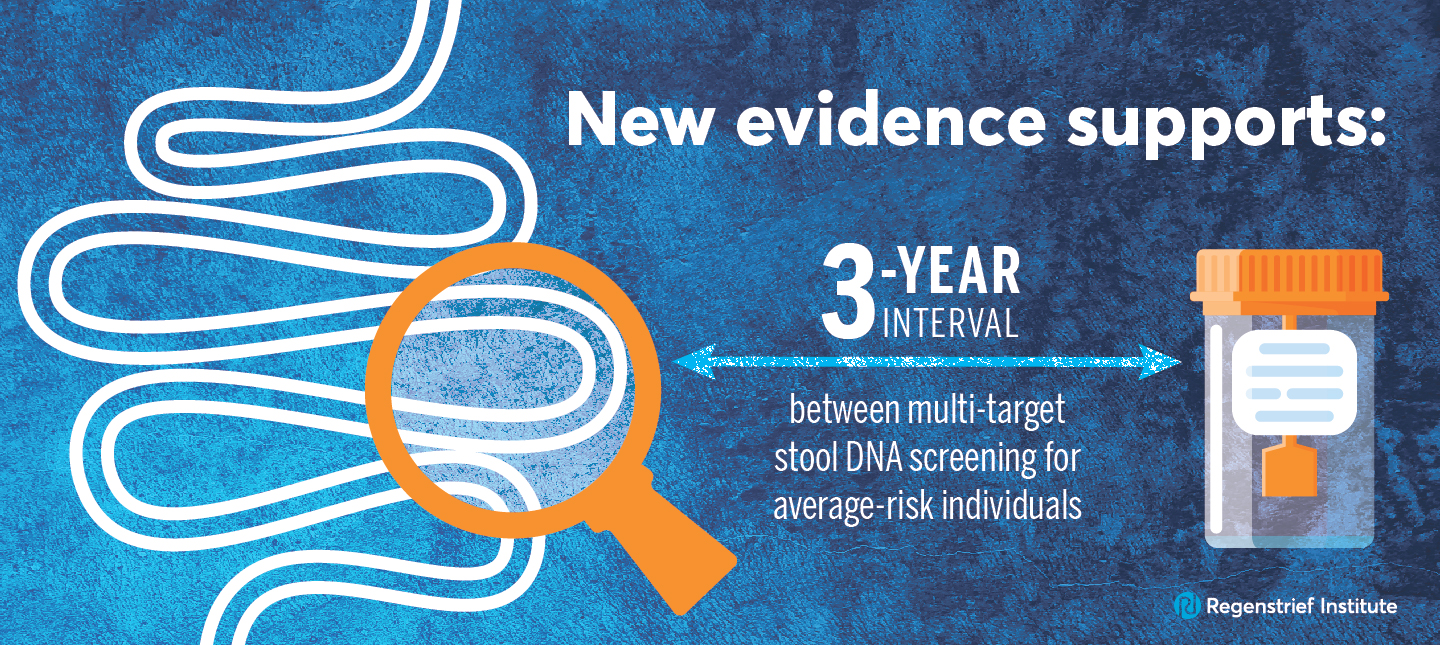A scientific study exploring the appropriate interval for colorectal cancer screening via non-invasive multi-target stool DNA testing for individuals with average risk for the disease reported finding no colorectal cancers three years after an initial negative multi-target stool DNA test. These results suggest that at least a three-year interval between screenings using this method is clinically appropriate.
The results of this multicenter study, led by Regenstrief Institute Research Scientist and Indiana University School of Medicine faculty member Thomas F. Imperiale, M.D., were determined via repeating the multi-target stool DNA test at year three, with test results confirmed via colonoscopy, the gold standard test for detecting colon cancers.
While no cancers were found by screening at the three-year interval, 63 advanced precancerous lesions were identified in the 591 study participants. The study authors note that because the test targets cancer and high risk pre-cancerous polyps and is not designed to identify non-advanced lesions, some found at three years may have become advanced since the previous multi-target stool DNA screening.
“This study provides screening age range adults and their clinicians with evidence-based information that they need on multi-target stool DNA screening frequency,” said Dr. Imperiale. “However, due to the constraints imposed by the pandemic when individuals and healthcare systems postponed or canceled appointments, the number of participants dwindled over the three years, and further study of the test interval is required. A three-year interval may be the most appropriate, but it is possible that a longer interval may work as well or better.”
A study of 10,000 patients led by Dr. Imperiale, published in the New England Journal of Medicine in 2014, reported that multi-target stool DNA testing, which requires a single stool sample expelled from the body directly into a container, detects 92.3 percent of colon cancers.
The ability of a test to detect disease – known as sensitivity – is the most important characteristic for cancer screening tests because the primary role of these tests is to “rule out” disease – in this case, a cancer of the colon or rectum. In 2021, national guidelines lowered the age recommended to begin screening for colon cancer from 50 to 45.
“Colon cancer screening tests like the multi-target stool DNA or the less sensitive annual fecal immunochemical test [FIT] are efficient ways to screen the population, especially those at the low-risk end of the average risk population, which includes most individuals in the younger age range of screening,” said Dr. Imperiale. “Using at-home tests encourages those who appreciate their ease of use and lower hassle factor to be screened. And it doesn’t simply benefit the individual, it benefits others who are high risk and are best screened with colonoscopy.”
Approximately seven or eight out of 10 individuals who fall within the range of those for whom colorectal cancer screening is recommended by national guidelines are considered to be at average risk for the disease.
Colon cancer is the third most common cancer in the U.S. and has a significant death rate for both men and women.
Dr. Imperiale focuses on developing and testing screening strategies based on individual risk factors and assessing diagnostics and therapeutics. Both the 2022 and the 2014 studies on multi-target stool DNA testing were funded by Exact Sciences Corporation, manufacturer of the multi-target stool DNA screening test.
“Three-Year Interval for the Multi-Target Stool DNA Test for Colorectal Cancer Screening: A Longitudinal Study” is published in Cancer Prevention Research. Authors of the paper, in addition to Dr. Imperiale of Regenstrief Institute and IU School of Medicine are Philip T. Lavin, PhD, Boston Biostatistics Research Foundation; Tara N. Marti, B.S., and, Debbie Jakubowski, PhD, Exact Sciences; Steven H. Itzkowitz, M.D., Mount Sinai Medical Center; Folasade P. May, M.D., PhD, MPhil, David Geffen School of Medicine at UCLA; Paul J. Limburg, M.D., MPH, Seth Sweetser, M.D., and Anas Daghestani, M.D., Mayo Clinic; and Barry M. Berger, M.D., Expath LLC.
Thomas F. Imperiale, M.D.
In addition to his role as a research scientist at Regenstrief Institute, Dr. Imperiale is a core investigator for the U.S. Department of Veterans Affairs Health Services Research and Development Center for Health Information and Communication, Richard L. Roudebush VA Medical Center. He is an Indiana University Distinguished Professor, the Lawrence Lumeng Professor of Gastroenterology and Hepatology at Indiana University School of Medicine and a member of the Indiana University Melvin and Bren Simon Comprehensive Cancer Center.
About Regenstrief Institute
Founded in 1969 in Indianapolis, the Regenstrief Institute is a local, national and global leader dedicated to a world where better information empowers people to end disease and realize true health. A key research partner to Indiana University, Regenstrief and its research scientists are responsible for a growing number of major healthcare innovations and studies. Examples range from the development of global health information technology standards that enable the use and interoperability of electronic health records to improving patient-physician communications, to creating models of care that inform practice and improve the lives of patients around the globe.
Sam Regenstrief, a nationally successful entrepreneur from Connersville, Indiana, founded the institute with the goal of making healthcare more efficient and accessible for everyone. His vision continues to guide the institute’s research mission.
About IU School of Medicine
IU School of Medicine is the largest medical school in the U.S. and is annually ranked among the top medical schools in the nation by U.S. News & World Report. The school offers high-quality medical education, access to leading medical research and rich campus life in nine Indiana cities, including rural and urban locations consistently recognized for livability.









